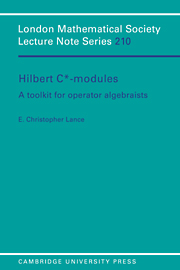Book contents
- Frontmatter
- Contents
- Preface
- 1 Modules and mappings
- 2 Multipliers and morphisms
- 3 Projections and unitaries
- 4 Tensor products
- 5 The KSGNS construction
- 6 Stabilisation or absorption
- 7 Full modules, Morita equivalence
- 8 Slice maps and bialgebras
- 9 Unbounded operators
- 10 The bounded transform, unbounded multipliers
- 11 What next?
- References
- Index
Preface
Published online by Cambridge University Press: 19 September 2009
- Frontmatter
- Contents
- Preface
- 1 Modules and mappings
- 2 Multipliers and morphisms
- 3 Projections and unitaries
- 4 Tensor products
- 5 The KSGNS construction
- 6 Stabilisation or absorption
- 7 Full modules, Morita equivalence
- 8 Slice maps and bialgebras
- 9 Unbounded operators
- 10 The bounded transform, unbounded multipliers
- 11 What next?
- References
- Index
Summary
This book is designed as a “second course in C*-algebras”. It presupposes a familiarity with the elementary theory of C*-algebras (the GNS construction, the functional calculus) such as may be found in any of the several excellent texts now available—[Dix 2], [KadRin], [Mur], [Ped], [Tak], for example. The aim, as indicated by the subtitle, is to provide the student with a collection of techniques that have shown themselves to be useful in a variety of contexts in modern C*-algebra theory.
These techniques centre round the quite elementary and natural concept of a Hilbert C*-module. As explained in Chapter 1, this is an object like a Hilbert space except that the inner product is not scalar-valued, but takes its values in a C*-algebra. The first three chapters present the elementary theory of Hilbert C*-modules and their bounded adjointable operators. From Chapter 4 onwards, tensor products figure prominently, and some knowledge of tensor products of C*-algebras (summarised at the beginning of Chapter 4) is needed.
Hilbert C*-modules have had three main areas of applications:
the work of Rieffel and others on induced representations and Morita equivalence ([BroGreRie], [Rie 1], [Rie 2]);
the work of Kasparov and others on KK-theory ([BaaJul], [Kas 1], [Kas 2]);
the work of Woronowicz and others on C*-algebraic quantum group theory ([BaaSka], [Wor 5]).
There is not very much information on any of these topics in this book, since the aim is to develop a toolkit rather than to demonstrate the tools in use.
- Type
- Chapter
- Information
- Hilbert C*-ModulesA Toolkit for Operator Algebraists, pp. vii - xPublisher: Cambridge University PressPrint publication year: 1995



